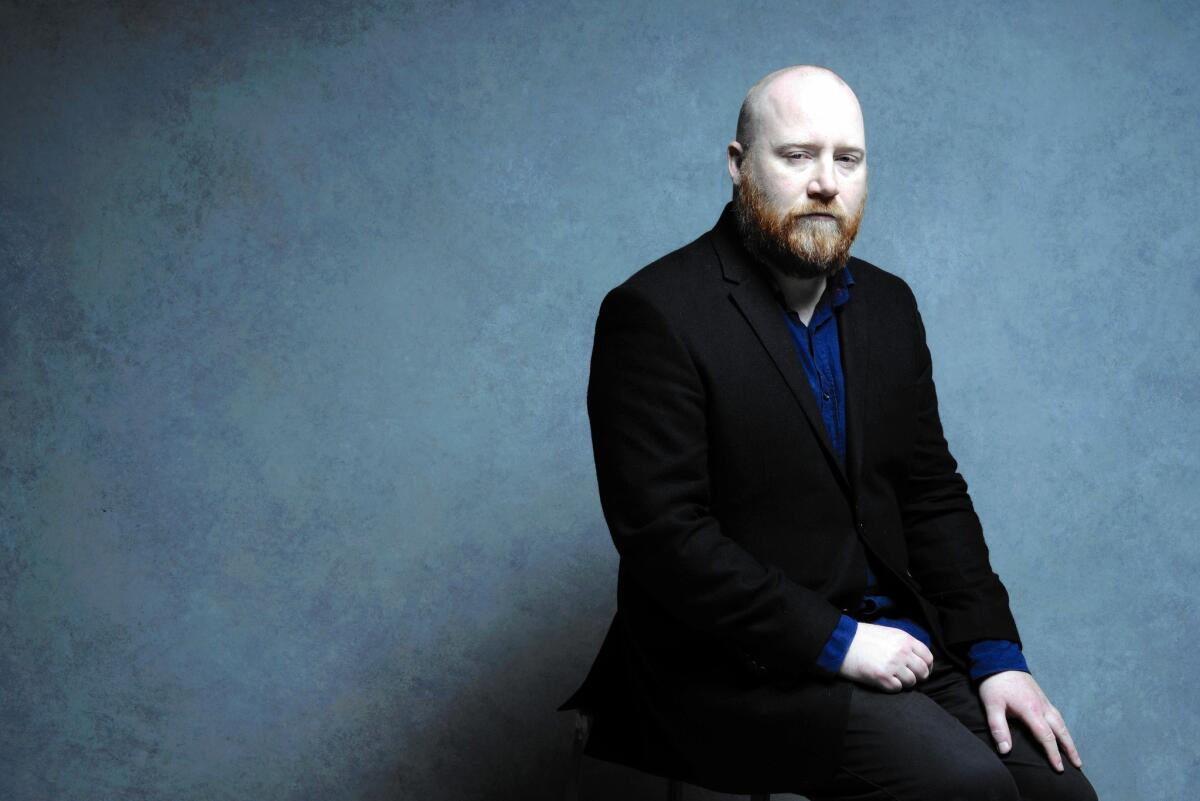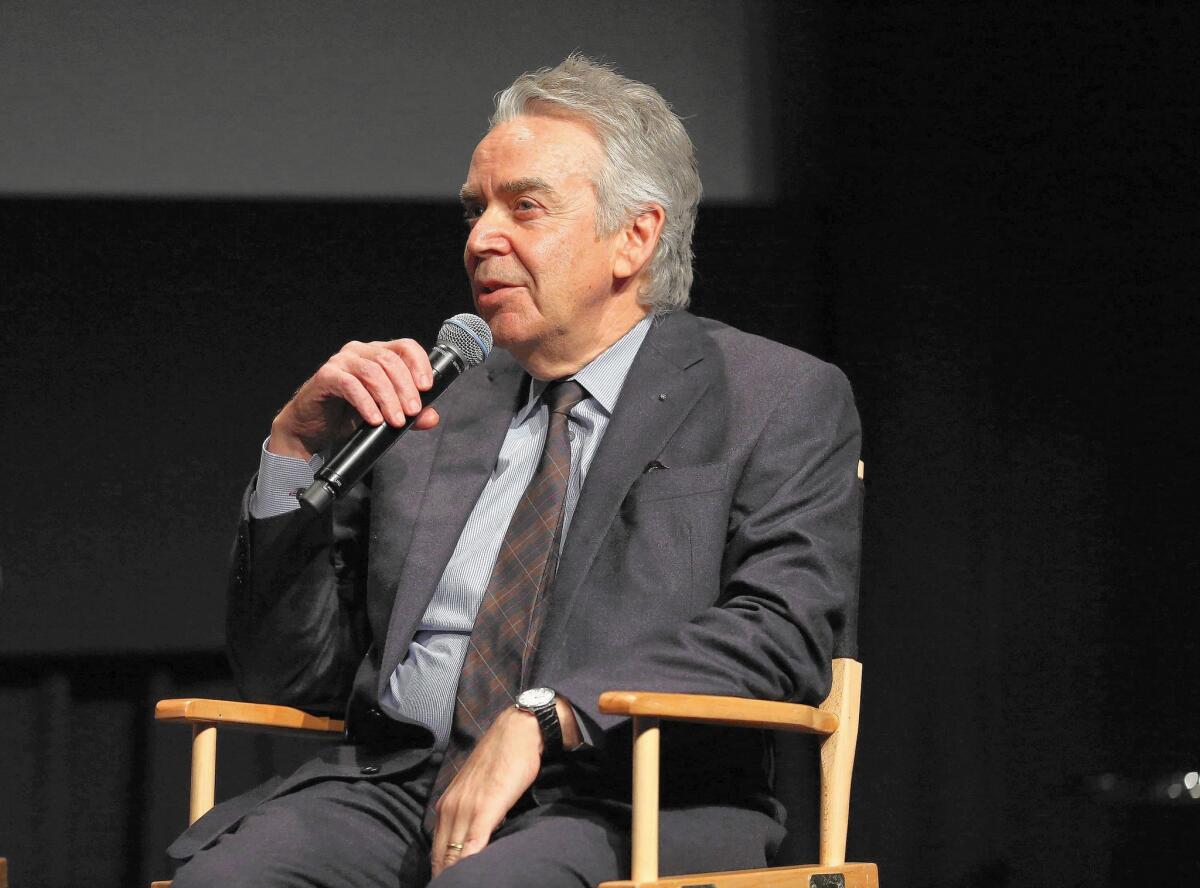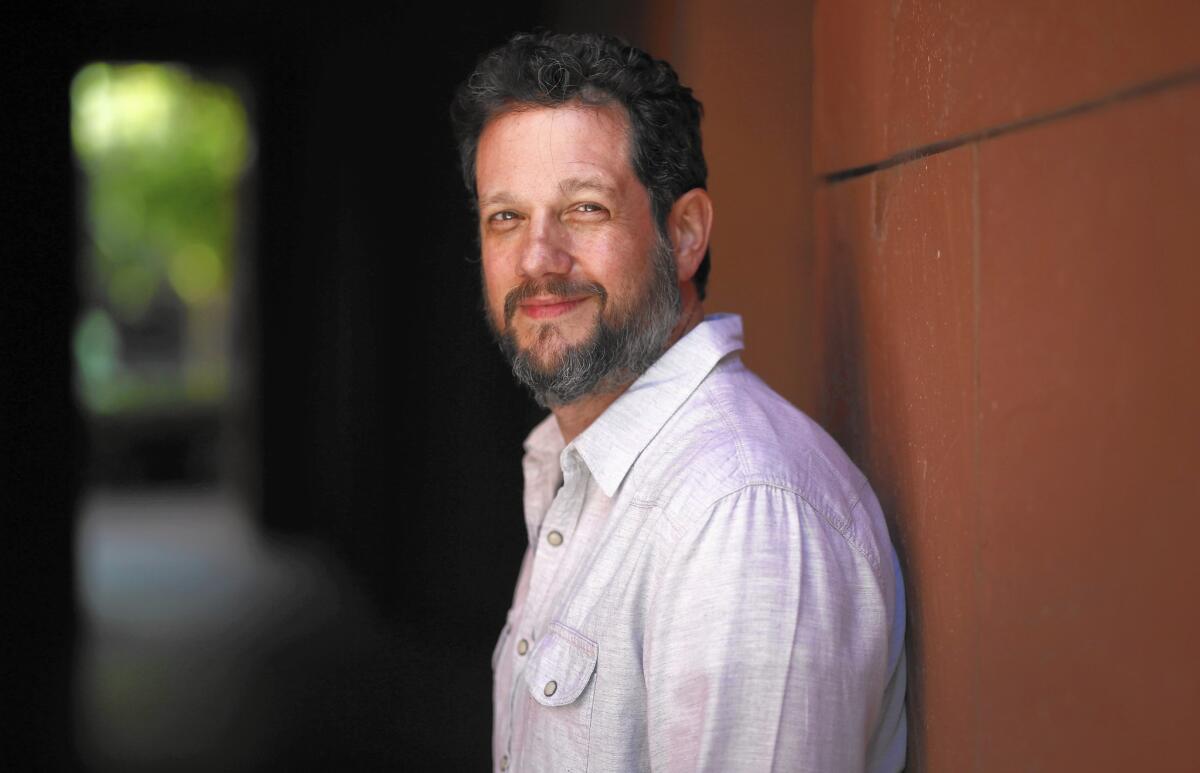Charting the Oscar contenders for original score, from ‘Steve Jobs’ to ‘The Martian’
- Share via
Some of the year’s top contenders for the original score Oscar soar while others flutter. Some draw heady inspiration from intellectual challenges, while others burrow into the Earth to shake something loose. Here, The Envelope takes a look at several of the composers behind them.
Daniel Pemberton

In this exclusive, behind-the-scenes-clip, watch “Steve Jobs” composer Daniel Pemberton work with director Danny Boyle to achieve the film’s distinct sound.
The film “Steve Jobs” is told in three distinct parts — described to composer Daniel Pemberton by director Danny Boyle as “Vision,” “Revenge” and “Wisdom” — and scored to match.
For the first act, Pemberton uses synthesizers to trace mental and emotional circuitry as complex and lightning quick as that of a motherboard.
“It was like traveling back in time as a composer,” he says of using 1984-era instruments. “You had synthesizers that could only play one note at a time or were so complicated to program, you had to take photos or make drawings of where the knobs were set.”
If Act I is Kraftwerk and Tangerine Dream, Act II is Shakespeare and Puccini.
“The second act, Danny described as a Shakespearean tragedy, in this amazing setting of the San Francisco Opera House. So why not write an opera? What better way to tell the story of the conductor, the showman of this elaborate circus, than with music that’s incredibly theatrical and dramatic? We even wrote lyrics in Italian about computers,” he says.
The third act, set in 1998, enjoys more modern technology to support it, yet is “more introverted, introspective and coldly emotional,” says Pemberton, completing a score as clever, resourceful and complex as its subject.
Jóhann Jóhannsson

The dour score for the drug-trade thriller “Sicario” may not be the kind of soaring melodic work the academy often favors, but it’s one of the year’s most effective soundtracks. Jóhann Jóhannsson, a nominee for last year’s “Theory of Everything,” here unconsciously channels David Bowie and Brian Eno at their darkest — think “Sense of Doubt” filtered through “True Detective.”
Director Denis Villeneuve “saw this as a war film in a way; he wanted me to write ‘subtle war music,’ which is a contradiction in terms but evocative,” says Jóhannsson, who cites experimental rock band Swans and Spectral composers Gérard Grisey and Horatiu Radulescu as influences. “I went for extreme ideas, a sound that was violent, physical, visceral; music that you feel in your body as much as you hear.”
The menacing theme, “The Beast,” is “a simple bass glissando played by eight contrabasses, combined with some guitar and some electric bass as well. It’s like the sound of descending into the Earth somehow.”
Michael Brook
In “Brooklyn,” a lone fiddle links the anxious Irish immigrant to her small hometown as she arrives in America. Like the film it accompanies, Michael Brook’s score is subdued, rather than reaching for operatic moments.
“The mantra was to find a delicate balance of supporting but not pushing emotions,” says Brook. “It felt like if you over-salted it or over-sugared it, it would turn people off. A lot of our time went into very fine tuning of the emotional aspects of the score.”
Harry Gregson-Williams
Composer Harry Gregson-Williams says of “The Martian” director Ridley Scott, “Ridley paints for fun, and he talks about texture and tone and light. He wanted me to track not just an emotional arc but a geographical one as [protagonist Mark Watney] travels across Mars. He wanted to feel, at first, a sense of trepidation, then the character gaining confidence. And a sense of majesty and awe about Mars. I had to make it optimistic and not entirely deadly serious” to match Mark.
Craig Armstrong
“Far From the Madding Crowd” is a traditional romantic soundtrack, just what should accompany Thomas Hardy’s rural Victorian drama. It finds moments of glory among expected textures — its swells and arpeggiated plays on the heartstrings feel motivated, rather than clichéd. Composer Craig Armstrong chose the solo violin as “the linchpin for the whole score. I was lucky enough to have worked with the violinist Clio Gould before; she’s such an amazing player.”
Armstrong drew inspiration from the French Impressionist-like use of harmony of Frederick Delius and the lightness of Vaughan Williams: “I played around with English folk traditions — but with the strings, you could go quite contemporary as well. So at times you had the contrast between the pastorale music and music that, say for the soldier [character], you could go angular and subvert that English romanticism.”
Gabriel Yared
Gabriel Yared’s music for “Kahlil Gibran’s The Prophet” is often lush and warm, reflecting the wisdom of the beloved poems in this animated adaptation. It’s a supple score, though, and moves from lighthearted to contemplative with Gibran’s subjects.
Yared says by email it “was like working on several films. There were many different directors that I collaborated with, each with their own ideas. Having said this, I certainly feel there is a real sense of unity throughout the film, which I hope the music has contributed significantly to. This message of peace, love and understanding has been made accessible to the world, where it is not bound by age, race or religion. To paraphrase a quote from Gibran, the music I have written is my love for this film made audible.”
Howard Shore

“Spotlight” is a real shoe-leather drama about the Boston Globe’s investigation of the Catholic Church pedophile scandal. Three-time Oscar winner Howard Shore’s score reflects the loneliness not only of the search for facts in the dark, but much more important, on tracks such as “Pain and Anguish,” the solo piano with its heavy pedal evoke how alone and isolated the victims must have felt. It is moody music without feeling heavy-handed, appropriate for so deadly serious a topic.
Michael Giacchino

“Inside Out” has a jaunty, late-’50s jazz feel to it. It’s dominated by a simple theme rooting us in a young girl’s head; variations of it express the array of emotions taking the fore. It’s one of the more memorable themes of the year and lends a distinct, almost period bent to the images.
Follow The Times’ complete coverage of the Golden Globes and Oscars
More to Read
From the Oscars to the Emmys.
Get the Envelope newsletter for exclusive awards season coverage, behind-the-scenes stories from the Envelope podcast and columnist Glenn Whipp’s must-read analysis.
You may occasionally receive promotional content from the Los Angeles Times.











